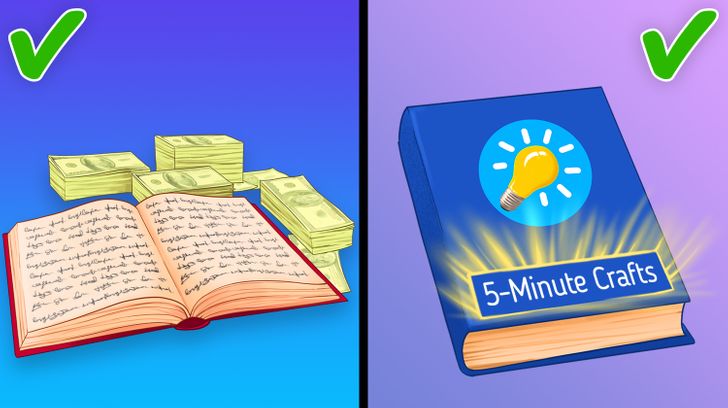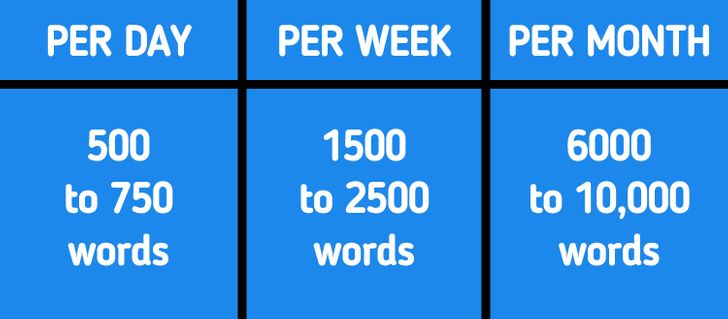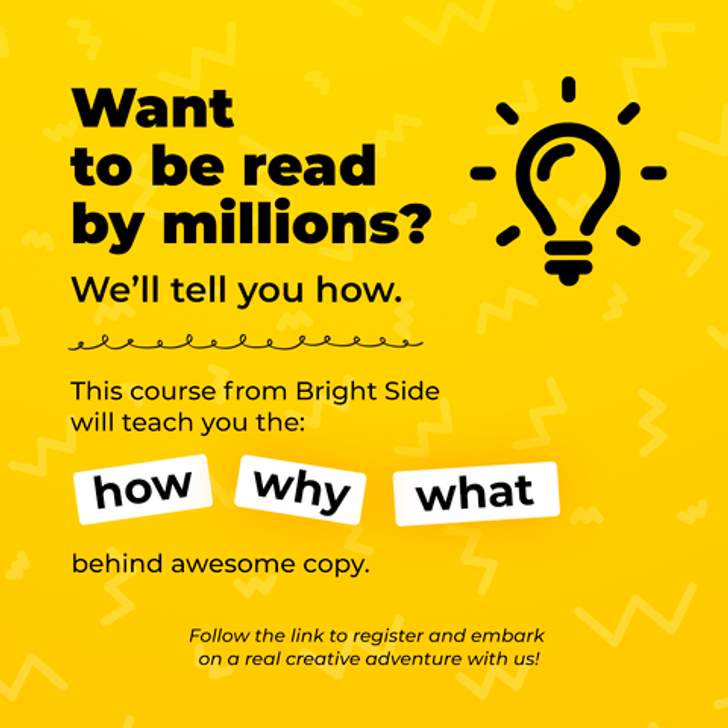How to Write a Book
Writing a book is one of the greatest ways to express yourself and tell a story that the whole world can hear. However, actually sitting down and writing one can seem like a challenge, especially if you don’t know where to start. That’s why we at 5-Minute Crafts are sharing how to begin your journey as an author and actually finish a book.
1. Think about why you want to write a book.

The first thing you want to do is be honest with yourself. Think about why you want to write a book. It could be because you want to become famous and rich, or maybe you need it to advance in your career. Perhaps your dream is to see your name on a book cover, or you simply have a story that you want the world to read about.
❗️ Remember that there is no right reason to write a book. However, finding your “why” will help you stay motivated during your journey.
2. Find your idea.

Finding your “big idea” about a book might seem like the most difficult step, however, it’s not. Keeping up with the writing will actually be your biggest hurdle. But still, without an idea, you won’t be able to finish the first page of your first draft.
Whether you know what you want to write about or you don’t have a clue, there are a few questions you can ask yourself that will help you settle on an idea:
❓ What do I want to write about?
❓ What do I think is important to write about?
❓ Who will be my targeted audience?
❓ Will I be able to finish the idea effectively?
3. Research your idea.

Now, once you have your idea, the next task is to do your research.
✅ Find out more about the genre you will be working on.
✅ Check similar books. See how many chapters they have and how long they are in their structure.
✅ Do your research on best sellers. Find out what made people read that book and what made the book a best seller.
4. Create the outline.

For a great book, you need to construct your outline. This is a great step, especially if you will be writing your very first book. This will be helpful if you get stuck, as most writers do. Here is a simple way to create your outline:
✅ Choose a format that you like. There are many different outlines you can choose from: a character-based, rigorous chapter-and-scene outline; a free-flowing mind map; and so on. If one doesn’t work for you, try another. Any plan that works for you means it’s the right one.
✅ Think about the beginning, middle, and end. If you don’t have a strong idea of how you should start your book, you might end up with a gloomy middle and maybe even a non-existent ending. Don’t rush and take your time to connect them. Great books have endings that will feel “earned,” so it’s important to build it from the beginning.

✅ Focus on the conflict points. These points are the heart of the book. They will draw in readers’ emotions, and any tension can actually reflect the message or theme you want to share. This doesn’t mean that you must know where the conflict will surface, but you should have a grasp on how it will go throughout your book.
✅ Develop your characters. If you haven’t developed your character yet, you can do it during your outline process. Think about how your characters will interact in the story, how they will demonstrate their interactions, what matters to them, and who they are.
5. Name your characters.

Giving your characters names can be a difficult process because there are a lot of things that can be taken into consideration. But to ease this process, you can follow these few tips:
Consider:
✅ Think about the time period your story takes place in.
✅ Choose your character’s age.
✅ Pick a name that fits the character’s personality.
✅ Find out the name’s meaning, especially if you want to connect it with the story.
✅ Choose easy-to-pronounce names.
Avoid:
⛔️ Don’t use the names of famous people.
⛔️ Repeat names of other fictional characters.
⛔️ Don’t create characters with similar names since this can confuse your readers and make it hard to tell the characters in the book apart.
⛔️ Choose names ending in “s.” At the very least, consider this rule for your main character because the possessive form can sound awkward. For example, “Travis” can be written like, “Travis’s brother.”
6. Focus on substance.

A lot of authors believe that writing a cool book is all about choosing the right style — figurative language, elaborate sentences, impressive vocabulary, etc. However, while this is good to consider, there is one thing even more important: focusing on the substance. This can be seen in themes, conflict, and plot. Here is what you should focus on accordingly.
❗️ Each sentence must do one of 2 things: continue the action or reveal the character.
❗️ Be aware of your pacing. If you are delaying the action by getting into too many details, it means you are focusing on the style and not on the substance.
❗️ Use a writing tool. You can use the Hemingway app to get suggestions on how to make your text better.
7. Find a productive place to write.

One essential thing that goes with creating a story, aside from figuring out how to do it, is knowing “where” to write. If you want to be able to complete a whole book, you need to find the right space for you to work in. Here’s how your work space should look.
✅ You need a quiet place. You can even use noise-canceling headphones.
✅ You need a clean space, especially if clutter makes you delay your writing and encourages your procrastination.
✅ You must find a place where you won’t be distracted. Make sure there isn’t any fun stuff going on around you to take your focus away. If needed, turn off your phone too.
✅ Find a place that’s your own. Make a nice environment in your home with plants, posters, etc. Or you can even write in your favorite cafe.
8. Set a word count goal and start writing.

Setting up word count goals will play an essential role in your writing process. It will make your work more effective and you’ll finish it in a set time frame. Set up word count goals per individual session weekly, or even per month. Here is the recommended word count:
✅ 500 to 750 words per day
✅ 1,500 to 2,500 words per week
✅ 6,000 to 10,000 words per month
Bonus: A writing mini-course.

Million-View Goals: How to Write Your Way Straight Into Your Reader’s Heart